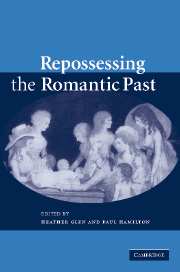Book contents
- Frontmatter
- Contents
- Notes on contributors
- Introduction
- PART I DISSENT AND OPPOSITION
- 1 ‘Severe contentions of friendship’: Barbauld, conversation, and dispute
- 2 Hazlitt's visionary London
- 3 Shelley's republics
- 4 Memoirs of a dutiful niece: Lucy Aikin and literary reputation
- 5 Holding Proteus: William Godwin in his letters
- PART II REOPENING THE CASE OF EDGEWORTH
- PART III DIFFERENT DIRECTIONS
- Marilyn Butler: a bibliography
- Index
5 - Holding Proteus: William Godwin in his letters
Published online by Cambridge University Press: 15 December 2009
- Frontmatter
- Contents
- Notes on contributors
- Introduction
- PART I DISSENT AND OPPOSITION
- 1 ‘Severe contentions of friendship’: Barbauld, conversation, and dispute
- 2 Hazlitt's visionary London
- 3 Shelley's republics
- 4 Memoirs of a dutiful niece: Lucy Aikin and literary reputation
- 5 Holding Proteus: William Godwin in his letters
- PART II REOPENING THE CASE OF EDGEWORTH
- PART III DIFFERENT DIRECTIONS
- Marilyn Butler: a bibliography
- Index
Summary
The 1980s and 1990s saw a transformation in the reading of prose literature of the eighteenth and early nineteenth centuries. This transformation was pioneered by enterprising academic editors, working closely with the forward-thinking London publishing house Pickering and Chatto, and began with the publication of a series of multi-volume scholarly editions of prose writers eminent in their own day, but largely unavailable to modern readers. For students of literature and history, a key event was the publication in 1989 of The Works of Mary Wollstonecraft, which brought together Wollstonecraft's entire oeuvre for the first time. This edition was closely followed by The Collected Novels and Memoirs of William Godwin, The Novels and Selected Works of Mary Shelley, The Works of Maria Edgeworth, The Works of Thomas De Quincey, and many others. Further landmark editions are in progress – notably The Works of Charlotte Smith. Large-scale editions such as these, each ‘dedicated to an archaeological task of recovery’, have provided the foundations for much of the rehistoricizing of authors, texts, and contexts that has distinguished recent critical and interpretative study of the Romantic era.
Marilyn Butler was in at the start of this new phase in Romantic editing, and its present expansiveness owes much to her timely recognition of the need for annotated, high-quality editions as a prerequisite to any critical repossession of the literary past.
- Type
- Chapter
- Information
- Repossessing the Romantic Past , pp. 98 - 116Publisher: Cambridge University PressPrint publication year: 2006



